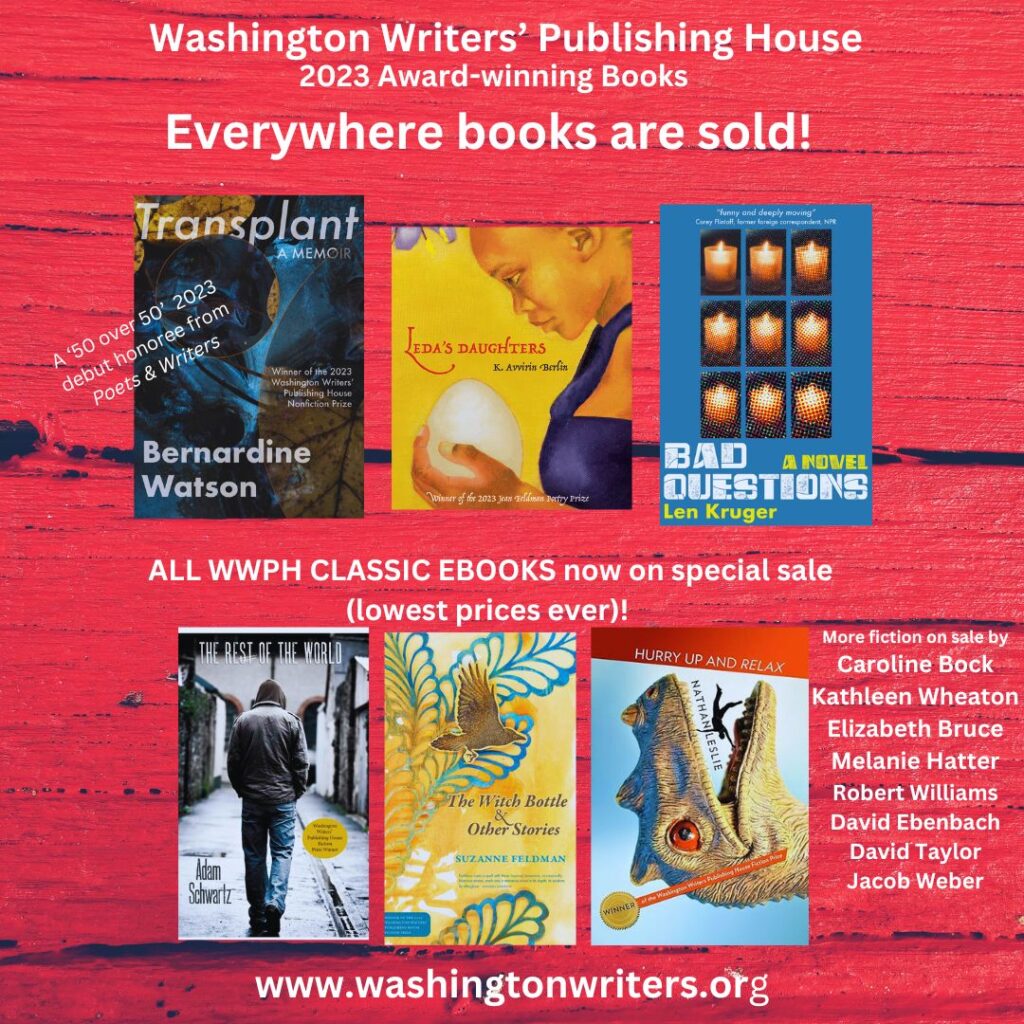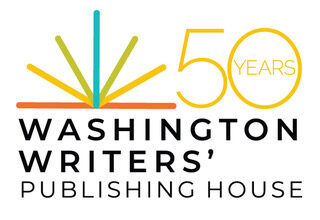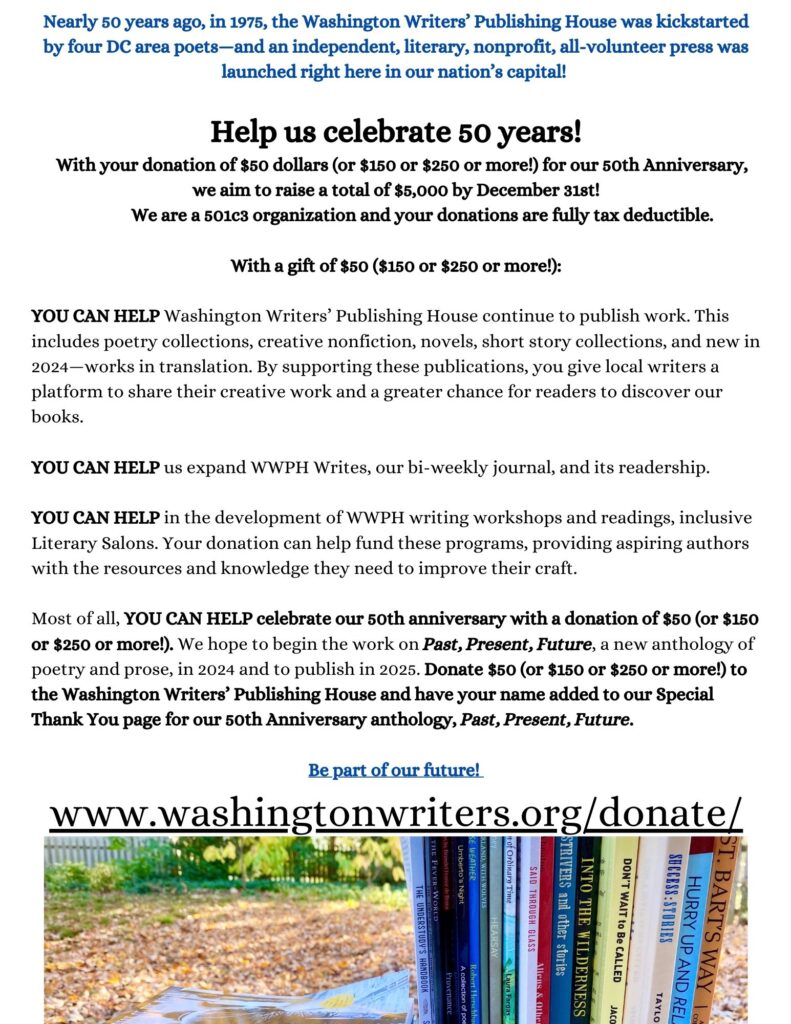WWPH WRITES ISSUE 62
Www
WWPH Writes 62… is about appreciation. In Jack Jacobs’ poem Avenue, the speaker realizes their appreciation for the unknown with this revelation, “Mystery holds the key/To joy,” and in Barbara A. Wanchisen’s creative nonfiction, Ten Years Later, the narrative is all about finding peace and appreciation in the act of memorializing a loved one.
Kim Roberts’ prose poem, Gertrude Stein, is reprinted here again–we had some spacing issues (gremlins, this editor will claim!) in the last issue. It’s worth another read, especially with its opening line, “I think of you, legs spread wide,” offering the promise of many more delights.
And some nice news to share — for the first time ever one of our award-winning books is included in the NPR BOOKS WE LOVE annual list! While we love all our award-winning books, it’s thrilling for our small press to have our first work of nonfiction, TRANSPLANT: A MEMOIR by Bernardine Watson, recognized in this way. If you haven’t bought a copy of TRANSPLANT yet, it’s available everywhere books are sold. Support indie bookstores and our affiliate page at bookshop.org here with your purchase.
Don’t miss our third annual WWPH WRITES THE HOLIDAYS poetry and prose contest. Our guest judge happens to be the versatile and creative Kim Roberts! The deadline is Sunday, December 3rd. It’s free to submit to WWPH WRITES THE HOLIDAYS. Details below.
Lastly, dear readers, we are beginning an effort to raise funds for our 50th anniversary celebrations in 2025. We plan to kick off our literary festivities in 2024. We hope you will join us and contribute $50 for 50. Our goal is to raise $5,000 by December 31st. We end with our fundraising appeal to you–help us continue to make this WWPH community thrive for all.
With appreciation for you all,
Caroline Bock
co-president, Washington Writers’ Publishing House
WWPH WRITES POETRY
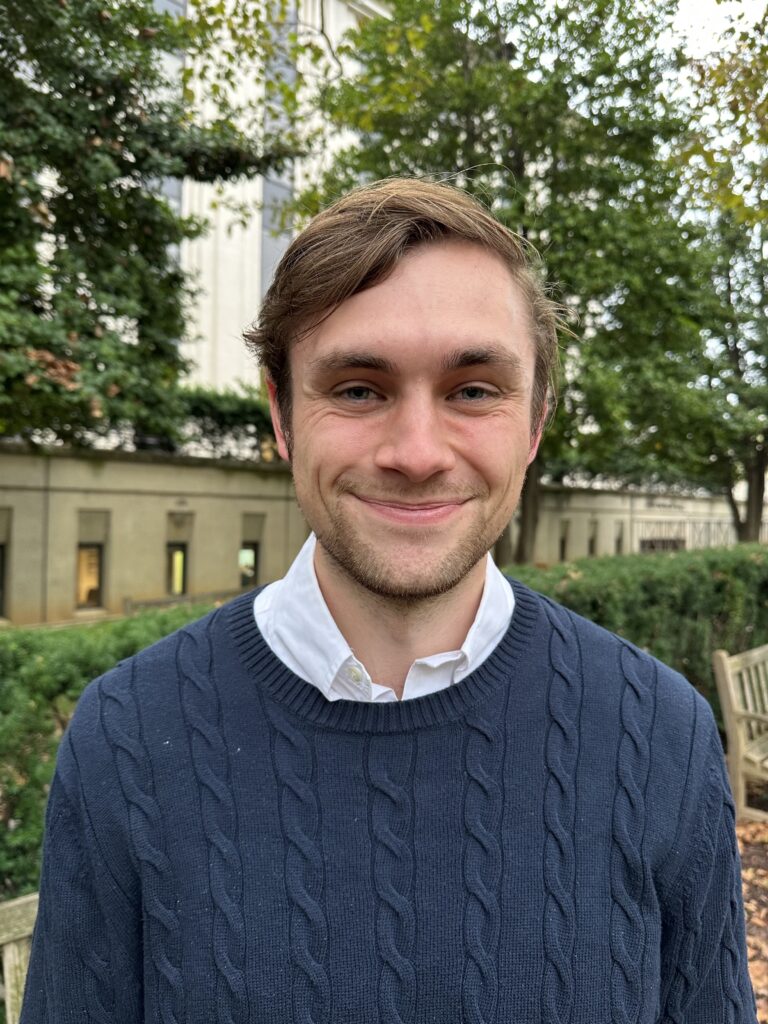
Jack Jacobs is a poet based in DC. He is a recent Dartmouth graduate and enjoys writing about cityscapes, the natural environment, and walking.
AVENUE
How I wish
I could stretch my fingers wide
Over the street
And grasp it
Study it,
Gaze at it
In my palm –
Just hold
To leave no cobblestone
Unturned,
No sight unseen,
Un-understood.
I wish
I could wring the city dry
Of its secrets
Of its lessons
To complete,
To check off,
To consume,
To digest.
I tried this week –
A large bite,
Overindulged,
Stomachache.
Perhaps I should eat
In bits,
In moderation,
Or just absorb
As it comes,
Forget ticking
And tying,
Be free in the unexplained.
Mystery holds the key
To joy,
Unknowing,
Ranging.
Here I am
In all my consuming,
In all my completing –
Silly me!
Forgetting you can never,
Even with all your sinews,
Wring the towel
Fully dry.
©Jack Jacobs 2023
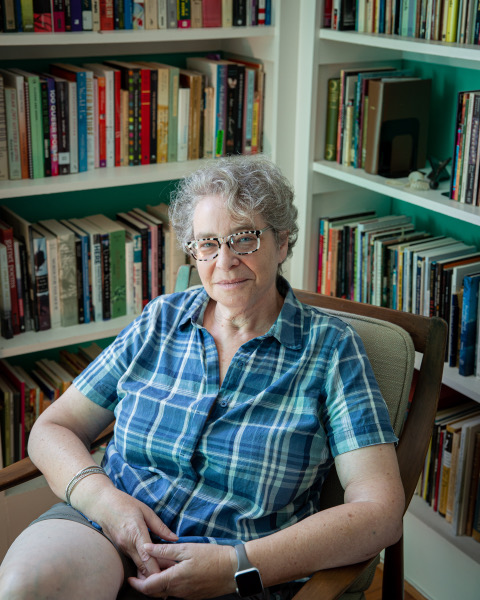
Kim Roberts is the author of six books of poems, most recently Corona/Crown, a cross-disciplinary collaboration with photographer Robert Revere (WordTech Editions, 2023). Roberts edited By Broad Potomac’s Shore: Great Poems from the Early Days of our Nation’s Capital (University of Virginia Press, 2020), selected by the East Coast Centers for the Book and DC Public Library to represent Washington, DC in the Route 1 Reads program. She is the author of the popular guidebook, A Literary Guide to Washington, DC: Walking in the Footsteps of American Writers from Francis Scott Key to Zora Neale Hurston (University of Virginia Press, 2018). In 2023, Roberts was the recipient of a Pride Poetry Residency at the Arts Club of Washington, grants from the DC Commission on the Arts, and an Individual Practitioner Fellowship from Humanities DC. More on her website here. Photo credit: Farrah Skeiky.
GERTRUDE STEIN
I think of you, legs spread wide. All the nights you’d write until the sun rose and Alice came
downstairs, gathered your winged papers, brought them to the typewriter with delight—
with delight!—to type up your pages. Alice’s baking, her honeyed aromas coming from the
kitchen, and the two of you snuggling in bed, making up pet names for each other’s vagina.
I think of your rooms of paintings, salon-hung, so the walls swam with color. Meaning in
the morning, feeling in the evening. The way you wrestled with syntax, wringing out
sentences so that even the most common items, butter for instance, became vehicles of
wonder. It all makes perfect sense when you say it out loud, you claimed—and sometimes
you were right, although sense was never the point. You rumbled repetition, you were
always half in darkness. All your clothes were tender. Alice’s too, with her delicate touch
unzipping. Bliss was always near: disrobing, spreading her thick, magnificent thighs.
©Kim Roberts 2023
WWPH WRITES CREATIVE NONFICTION
Barbara A. Wanchisen lives in Washington, DC, and is an avid east-coast aficionado, hailing originally from New Jersey. She has been a tenured professor of psychology, a lobbyist promoting the behavioral sciences, and a board director at a DC-based science organization involved in public policy. She holds an M.A. in English and a Ph.D. in Psychology.
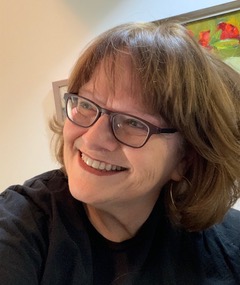
TEN YEARS LATER
On a hot, humid day in August, I found myself sitting in a back row pew of Saint Patrick’s Catholic Church in Washington, DC. I was not a believer in Christianity and no mass was underway.
I stared at the lighted candles flickering near the altar and could smell decades of evidence of the priests, nuns, and parishioners who had graced this building – remnants of candle wax, incense, holy water, and probably human sweat.
This did seem to be exactly the right place for me.
Months earlier, during the freezing days of January, I had realized that this summer would mark the ten-year anniversary of my mother’s death. A decade had almost passed.
I generally had come to terms with my mother’s death despite occasional brooding but a whole decade signaled that something new was happening. Was it a new phase? After all, people celebrate anniversaries in five or ten-year blocks for happy occasions.
Would a full decade of time signal or compel me to mark a sad occasion? Should I hold a kind of memorial for this event, somehow offer a new tribute to my mother’s memory? What was the right thing to do, if anything, to mark this moment?
I decided to not tell anyone about this pending anniversary. I didn’t even raise it with family.
I wasn’t sure if any special acknowledgement was necessary nor was I exactly sure what I was trying to achieve. So, I remained silent.
As the days and weeks went by, I thought about the date, specifically August 8, off and on, and mentally debated several ways that I might honor my mother. After all, I had time to figure it out because as the year had just begun.
Would I travel to my mother’s gravesite in northeast Pennsylvania and stand by it at the time she died and think about her? If so, I could then drive around the town, stop at key locations that meant something to her, and I could remember what she had said about growing up there.
But I worried that this idea would be too big of a commitment and might set me up for a deeply sad day or set of days, not a day of clearly honoring her memory but one of consoling myself.
Then again, are those two things – honoring someone’s memory and consoling oneself – necessarily mutually exclusive?
As time marched closer to the date, I considered asking people if, and how, they have honored others who had died when a particular number of years had passed. But I didn’t.
Then about two weeks before August 8, anxiety set in. I had not decided what to do with the day and it would be soon upon me. When people asked if something was wrong, I’d say I was stressed by world events or mention some slight I might have suffered on a given day.
I was barreling toward that anniversary that I could no longer control. I had made no plan, told no one, and it was full speed ahead to the appointed date.
On August 8, I woke up as normal and was not upset that I had not made a plan. I found that curious.
I decided that I would visit the nearby Saint Patrick’s Catholic Church. My mother was Catholic her whole life, and she thought that lighting a candle at a church to remember someone was a good thing to do. I wandered into this local church about an hour before a mass was to be held.
The organist was practicing, and stopped sometimes, maybe to review the day’s program or take notes. But the pleasant sounds of organ music filled the church, however choppy in places, as I walked to a display of candles near the altar.
I lit a candle for my mother, stood a while, watched it flicker as I thought about her life, and then took a seat in the back of the church in full view of the altar.
She would have liked that I lit a candle for her that day. She would have liked that I was just there in the church thinking about her at all.
I couldn’t grasp that it was already ten years since she had died, and I thought about how much she had influenced the direction of my life when I was growing up. I wished that I could thank her for all that she did and all that she said to me over the years to support my choices, but that was nothing new. Not thanking her enough when she was alive is one regret that I am sure I will never shake.
As I sat lost in thought over the next half hour or so, the church became quiet. The organist was no longer practicing, and the altar was ready, so next would be the arrival of the faithful. It was time to make my move without fanfare and slip away unnoticed.
A few days later I was talking with my friend Heidi about how I had tried to plan something to honor my mother but that I wound up basically doing nothing except lighting a candle and reflecting on her life.
“But you did honor her – you honored her and you went on with your day – that was good,” she said. I have realized that honoring my mother and consoling myself are not mutually exclusive events. Actually, they are the same thing: the same rich and special event. No hoopla, no party, no fanfare is required because honoring her is a feeling inside of me whenever I think of her fondly, or light a candle in a church, or tell a story about her life. It’s a feeling of peace and appreciation.
©Barbara A. Wanchisen 2023
WWPH Community NewS
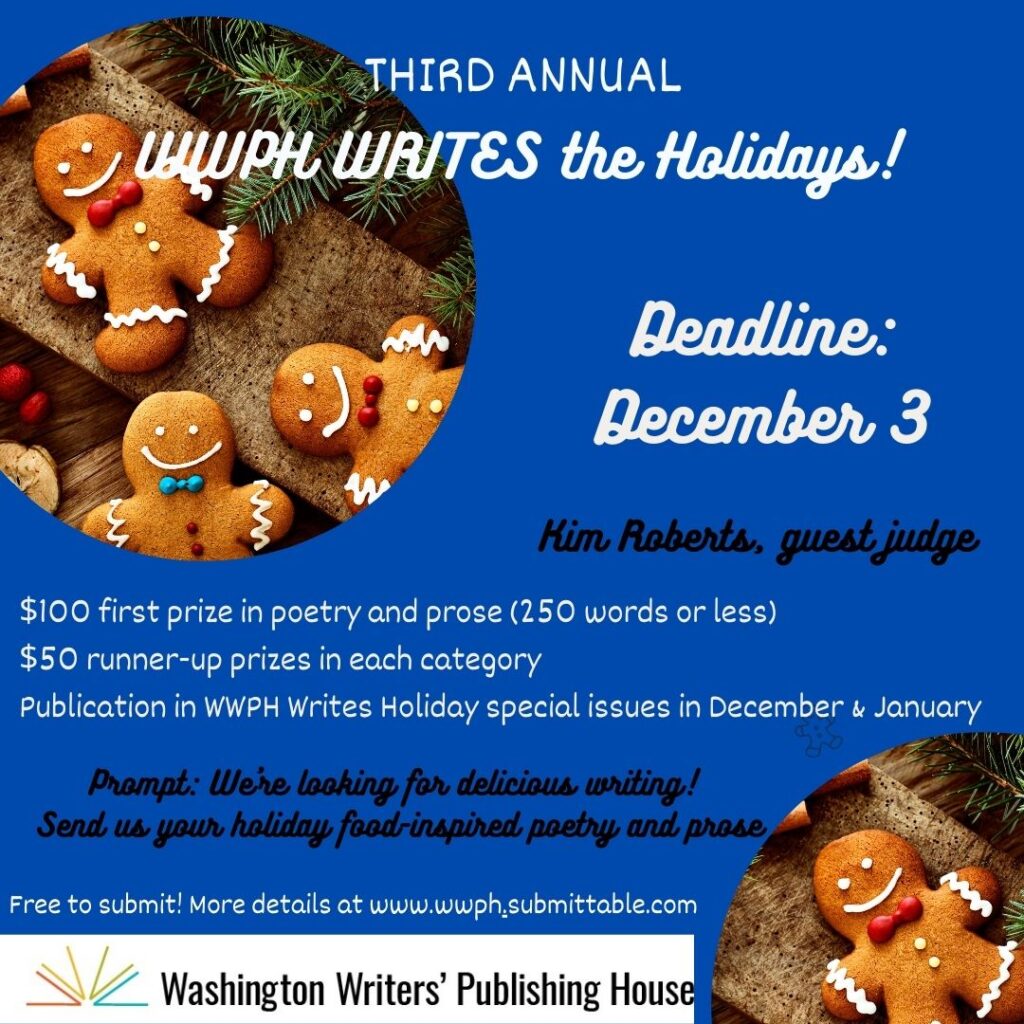
Read our letter to you, dear readers, below:
We are also happy to accept checks. Please see our donation site here for our WWPH snail mail address. Most of all, thank you for considering a donation to our (almost) 50-year-old literary press! Questions about a donation? We would be happy to answer via wwphpress @ gmail.com
